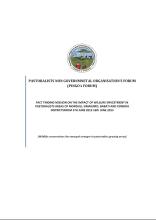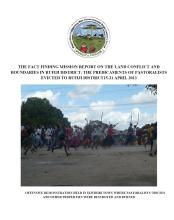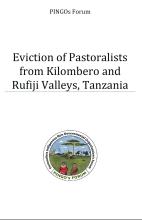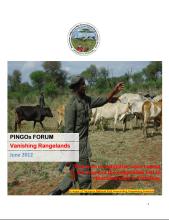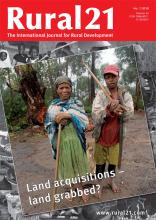Land Library
Welcome to the Land Portal Library. Explore our vast collection of open-access resources (over 74,000) including reports, journal articles, research papers, peer-reviewed publications, legal documents, videos and much more.
/ library resources
Showing items 1 through 9 of 10.This fact finding is the fulfilment of PINGO’s Forum daily activities for inquiring the challenges facing pastoralists communities. In this fact finding, we will look at the impact of wildlife conservations in pastoralists areas.
This fact finding mission had been organised to investigate the challenges facing pastoralists in Rufiji District, the challenges which have been defined as the source of conflict in this district.
This report springs from series of field visits.Its aim was, among others, to examine further the extent of human rights violations suffered by pastoralists in Kilombero and Rufiji valley during the evictions.
The primary aim of this study is to investigate the size of the range lost to other forms of land uses. This will support the argument that it is time to reconsider the pastoralists sector as a legitimate mode of production in the country which, like other sectors, deserve due priority.
Since the 2008 food price crisis, foreign investors have been acquiring more and more land in poor countries for producing foodstuffs and biofuels for their own use. Such investments have the potential to promote rural development and food security worldwide.
As the world continues to experience a severe food crisis, with over one billion people going hungry, land grabbing – the purchase or lease of land by wealthy, food-insecure nations and private investors from mostly poor, developing nations in order to produce food crops for export – is gaining m
Large land acquisitions can have a deep, lasting e? ect on livelihoods, food security and the future of agriculture, so there is a need for strategic thinking, vigorous public debate and government responsiveness to public concerns, especially in recipient countries
Land is an asset of enormous importance for billions of rural dwellers in the developing world.
Lessons learnt from India prove that people empowerment through self-help groups and target group orientation still matters for sustainable rural development. However, this is only true if economic, socio-cultural, political and environmental empowerment interlock.

